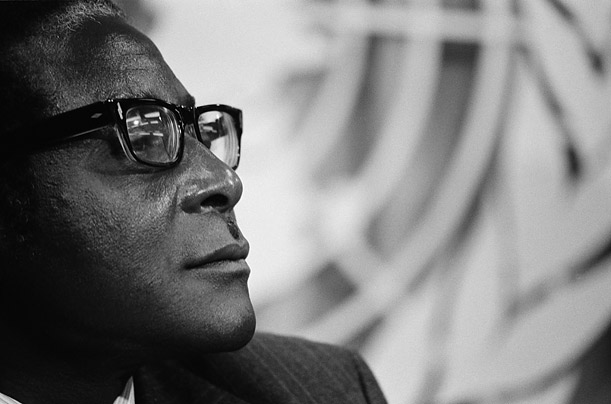Review: Zunami! The 2009 South African Elections Edited by Roger Southall and John Daniel
By Sean Jacobs | November 2009
The first part of the title of this book is a play on a statement made by Zwelinzima Vavi, Congress of South African Trade Unions (Cosatu) general secretary, in 2005. At the time Vavi had said that any attempt to stop Zuma, then the ANC’s deputy president as he was preparing a challenge to Thabo Mbeki’s leadership, would be like ‘… trying to fight against the big wave of a tsunami’. The editors of this volume suggest that the most recent general election in South Africa, April 2009, was mainly a referendum on Jacob Zuma. Though a number of other developments were also interesting — a decline in national support for the ANC with the exception of KwaZulu-Natal (it lost 5-10% of its vote share in eight of the nine provinces), the emergence of the new opposition party, the Congress of the People (COPE), among others— events around Zuma since 2005 dominated these elections.
Keywords: South Africa
Introduction: The Politics of Jacob Zuma
By Sean Jacobs | November 2009
Jacob Zuma, the President of Africa’s most powerful democracy since April 2009, and the recently chosen ‘African President of the Year’ (Sapa 2009), arouses strong passions from his supporters and detractors. A longtime ANC official from a humble peasant background in what is now Kwazulu-Natal province, Zuma was picked by the ANC to be the country’s deputy president under Thabo Mbeki in 1999. The men, close colleagues during exile (and during the early years of negotiating with the Apartheid government), appeared to only enjoy a friendly rivalry at that point. So when it came to predicting who would lead South Africa when Mbeki departed the national stage, most observers did not think of Zuma as a serious contender. He hardly featured in the daily cut and thrust of national politics.
Keywords: Jacob Zuma • South Africa • Thabo Mbeki
Reflections on Mahmood Mamdani’s ‘Lessons of Zimbabwe’
By Sean Jacobs | March 2009
Mahmood Mamdani, a university professor of anthropology at Columbia University in New York City remains one of the pre-eminent scholars of African Studies in the West. He also remains prolific, often taking the lead in unpacking controversial debates. For example, this month he has a new book out on the Darfur crisis, Saviors and Survivors: Darfur, Politics, and the War on Terror (Knopf, 2009). And few can disagree about the impact of his previous two books. Good Muslim, Bad Muslim: America, the Cold War, and the Roots of Terror (Pantheon, 2004) certainly contributed—especially in popular media—to our understanding of the historical roots of the “War on Terror”: to the United States’ engagement in proxy wars in Southern Africa, Latin America and Afghanistan and the antecedents of “collateral damage.” A decade earlier, his Citizen and Subject: Contemporary Africa and the Legacy of Late Colonialism (Princeton, 1996) became a must-read in universities. So when, in early December 2008, the London Review of Books published a long essay by Mamdani on the ongoing political and economic crises (at least for a decade now) in Zimbabwe, it was inevitable that it would provoke debate. As one critic of Mamdani’s concedes in this issue, “…whatever Mamdani writes he is always brilliant and provocative.”
Keywords: London Review of Books • Mahmood Mamdani • Robert Mugabe • Zimbabwe
Review: Heidi Holland’s Dinner with Mugabe
By Sean Jacobs | December 2008
In 1957 Ghana became the first former European colony in Africa south of the Sahara to gain its political independence. Kwame Nkrumah, Ghana’s new Prime Minister, invited young Africans from countries still under colonial rule to move to Ghana and help built the new country. Among the new immigrants was a young schoolteacher from Rhodesia, Robert Mugabe. The young Mugabe quickly settled in Ghana. In 1960 during a visit home to see his mother, however, Mugabe was invited to join a march against the arrest of two nationalist leaders, in the Rhodesian capital Salisbury. Facing police, the marchers stopped to hold an impromptu political rally. Somehow Mugabe found himself hoisted onto the improvised stage alongside other leaders like Joshua Nkomo, who was heading the leading black opposition group, the National Democratic Party. Mugabe gave a rousing speech (“The nationalist movement will only succeed if it based on a blending of all classes of men”) and impressed nationalist leaders soon convinced him not to return to Ghana and instead become publicity secretary of the National Democratic Party that later morphed into the Zimbabwe African People’s Union or ZANU. Three years later Mugabe engineered a split within ZAPU to form the Zimbabwe African National Union. He would dominate that country’s politics from then on.
Keywords: Zimbabwe
What next in South Africa
By Sean Jacobs | September 2008
Sean Jacobs (Concerned Africa Scholars co-chair), writes about the end of the Mbeki-era and its aftermath at The Guardian Online.
Keywords: South Africa
Robert Mugabe’s Legacy
By Sean Jacobs | September 2008
One of the legacies of that time – and a testament of the power of the nationalist narrative that African independence leaders embodied – is that few if any of Mugabe’s present Western critics publicly denounced these murders. Instead he received a knighthood from Queen Elizabeth II in 1994 and honorary degrees from American universities. …read the rest
Keywords: Zimbabwe


